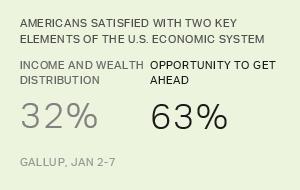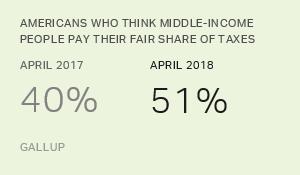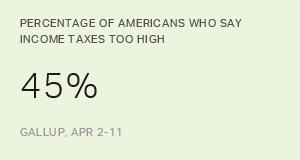Story Highlights
- 43% of Democrats say having a rich class is beneficial to the U.S.
- 81% of Republicans report the same
- Overall, 58% of all Americans agree that having a rich class is a benefit
WASHINGTON, D.C. -- The 43% of Democrats who say the U.S. benefits from having a class of rich people is down significantly from six years ago, and Democrats remain much more negative than either Republicans or independents about the impact of a rich class. Roughly eight in 10 (81%) Republicans and 57% of independents say having a rich class is good for the nation, little changed from 2012.
| 2012 | 2018 | Change | |||||||||||||||||||||||||||||||||||||||||||||||||||||||||||||||||||||||||||||||||||||||||||||||||
|---|---|---|---|---|---|---|---|---|---|---|---|---|---|---|---|---|---|---|---|---|---|---|---|---|---|---|---|---|---|---|---|---|---|---|---|---|---|---|---|---|---|---|---|---|---|---|---|---|---|---|---|---|---|---|---|---|---|---|---|---|---|---|---|---|---|---|---|---|---|---|---|---|---|---|---|---|---|---|---|---|---|---|---|---|---|---|---|---|---|---|---|---|---|---|---|---|---|---|---|
| % | % | pct. pts. | |||||||||||||||||||||||||||||||||||||||||||||||||||||||||||||||||||||||||||||||||||||||||||||||||
| Republicans | 80 | 81 | +1 | ||||||||||||||||||||||||||||||||||||||||||||||||||||||||||||||||||||||||||||||||||||||||||||||||
| Independents | 59 | 57 | -2 | ||||||||||||||||||||||||||||||||||||||||||||||||||||||||||||||||||||||||||||||||||||||||||||||||
| Democrats | 52 | 43 | -9 | ||||||||||||||||||||||||||||||||||||||||||||||||||||||||||||||||||||||||||||||||||||||||||||||||
| ║┌┴¤═° | |||||||||||||||||||||||||||||||||||||||||||||||||||||||||||||||||||||||||||||||||||||||||||||||||||
These latest results are from a May 28-June 3 ║┌┴¤═° survey.
Inequality has become an increasingly frequent talking point of liberal and Democratic leaders in recent years, including the Occupy Wall Street movement in 2011 and the highly visible focus on the top "1%" of Americans on the socioeconomic ladder. Additionally, the 2016 Democratic presidential field included Vermont Sen. Bernie Sanders, whose major focus was espousing the need for redistributive policies in order to address widening inequality in the country. At the same time, Donald Trump ran for and won the presidency as a wealthy Republican who unabashedly praises the rich and rich people. Both factors may help explain why rank-and-file Democrats across the country have become less likely to believe a rich class has a positive effect on U.S. society.
In 1990, 62% of all Americans were positive about having a rich class, and a similar percentage, 63%, held that view in 2012. Now, with a reduced proportion of Democrats saying the country benefits from having a class of rich people, the overall percentage of U.S. adults holding this view has edged down to 58%.
| Yes | No | No opinion | |||||||||||||||||||||||||||||||||||||||||||||||||||||||||||||||||||||||||||||||||||||||||||||||||
|---|---|---|---|---|---|---|---|---|---|---|---|---|---|---|---|---|---|---|---|---|---|---|---|---|---|---|---|---|---|---|---|---|---|---|---|---|---|---|---|---|---|---|---|---|---|---|---|---|---|---|---|---|---|---|---|---|---|---|---|---|---|---|---|---|---|---|---|---|---|---|---|---|---|---|---|---|---|---|---|---|---|---|---|---|---|---|---|---|---|---|---|---|---|---|---|---|---|---|---|
| % | % | % | |||||||||||||||||||||||||||||||||||||||||||||||||||||||||||||||||||||||||||||||||||||||||||||||||
| 2018 May 28-Jun 3 | 58 | 39 | 3 | ||||||||||||||||||||||||||||||||||||||||||||||||||||||||||||||||||||||||||||||||||||||||||||||||
| 2012 May 3-6 | 63 | 34 | 3 | ||||||||||||||||||||||||||||||||||||||||||||||||||||||||||||||||||||||||||||||||||||||||||||||||
| 1990 May 17-20 | 62 | 32 | 6 | ||||||||||||||||||||||||||||||||||||||||||||||||||||||||||||||||||||||||||||||||||||||||||||||||
| ║┌┴¤═° | |||||||||||||||||||||||||||||||||||||||||||||||||||||||||||||||||||||||||||||||||||||||||||||||||||
Democrats Just as Likely as Republicans to Want to Be Rich
The big partisan gap in philosophical beliefs about the value of a class of rich people in the U.S. does not necessarily translate into a denial of the personal advantages of being rich. About six in 10 Democrats, independents and Republicans say that if they had their choice, they would want to be rich. (The question wording did not define precisely what it would mean to be "rich.")

The desire to be rich is most prevalent among those under age 50 -- about two-thirds of whom say they would like to be rich if they could. This desire drops slightly among 50- to 64-year-olds, and then more significantly among those 65 and older. Seniors may have less interest in being rich because most say they have enough money to live comfortably and presumably at this later point in their lives, they are less likely to see a use for sudden, additional wealth. Still, 44% of those 65 and older say they would be rich if they had a choice.
║┌┴¤═° has asked this question about getting rich four times since 1990, and the desire to be rich has changed very little over that period.
A Third Say It's Likely They Could Become Rich -- Little Changed From 1990
Even though six in 10 Americans want to be rich, only about a third of Americans say it is very or somewhat likely they will ever be rich; a third say it is not very likely; and about a third rule it out altogether. (Only 10% of Americans are optimistic enough to say it is very likely they will be rich.)
| Very/Somewhat likely | Not very likely | Not at all likely | |||||||||||||||||||||||||||||||||||||||||||||||||||||||||||||||||||||||||||||||||||||||||||||||||
|---|---|---|---|---|---|---|---|---|---|---|---|---|---|---|---|---|---|---|---|---|---|---|---|---|---|---|---|---|---|---|---|---|---|---|---|---|---|---|---|---|---|---|---|---|---|---|---|---|---|---|---|---|---|---|---|---|---|---|---|---|---|---|---|---|---|---|---|---|---|---|---|---|---|---|---|---|---|---|---|---|---|---|---|---|---|---|---|---|---|---|---|---|---|---|---|---|---|---|---|
| % | % | % | |||||||||||||||||||||||||||||||||||||||||||||||||||||||||||||||||||||||||||||||||||||||||||||||||
| 2018 May 28-Jun 3 | 32 | 34 | 32 | ||||||||||||||||||||||||||||||||||||||||||||||||||||||||||||||||||||||||||||||||||||||||||||||||
| 2012 May 3-6 | 28 | 40 | 32 | ||||||||||||||||||||||||||||||||||||||||||||||||||||||||||||||||||||||||||||||||||||||||||||||||
| 2003 Jan 20-22 | 31 | 37 | 31 | ||||||||||||||||||||||||||||||||||||||||||||||||||||||||||||||||||||||||||||||||||||||||||||||||
| 1996 Apr 25-28 | 34 | 37 | 27 | ||||||||||||||||||||||||||||||||||||||||||||||||||||||||||||||||||||||||||||||||||||||||||||||||
| 1990 May 17-20 | 32 | 32 | 35 | ||||||||||||||||||||||||||||||||||||||||||||||||||||||||||||||||||||||||||||||||||||||||||||||||
| ║┌┴¤═° | |||||||||||||||||||||||||||||||||||||||||||||||||||||||||||||||||||||||||||||||||||||||||||||||||||
There has been no sustained change in these views since 1990. The 32% who say they are very or somewhat likely to be rich is exactly the same proportion that ║┌┴¤═° measured 28 years ago.
Apparently, Americans' perceptions about their chances of economic upward mobility are a fixed component of their thinking rather than attitudes that vary based on the current economy or on cultural or thought-leader memes.
The young are most likely to say they will ever be rich, as has been the case in previous surveys. Over half of those under 30 say it is likely they will be rich. That compares with just 10% of those 65 and older. (Only 1% of Americans say they are currently rich, and that group has been excluded from these analyses.) Republicans are slightly more likely than Democrats to believe they will be rich.

Implications
The widening partisan gap in views of the benefits of a rich class illuminates a fundamental divide on one of the most important aspects of the American economic system -- the acceptability of having "haves" and "have-nots" in contemporary society.
The political discussion of inequality in the U.S. and what should be done about it has historically centered on two perspectives. Republicans have traditionally tilted toward belief in the "trickle down" benefit of having a wealthy class. This is based on the assumption that a rich class provides motivation for entrepreneurial and professional enterprise that keeps business moving and, ultimately, benefits all Americans. Also, the wealthy pay the bulk of the nation's taxes and provide the bulk of the nation's charitable contributions. Over eight in 10 Republicans appear to adhere to this view.
The other perspective argues that the increasing divide between rich and poor highlights the unacceptable situation of many at the bottom end of the socioeconomic spectrum. Adherents of this view often believe the wealthy increasingly rig the system to their -- and their heirs' -- benefit. They also tend to believe it is unjust to have a small group enjoying great wealth while many others suffer. Democrats appear to be increasingly favoring this view.
The personal desire to be rich is to some degree disconnected from the philosophical view of the value of a rich class, as over half of those who say it is not good to have a rich class nevertheless say that they themselves would like to be rich if they had a choice.
Other ║┌┴¤═° research shows that Americans believe money and wealth in the nation should be more evenly distributed, and a majority believe that upper-income Americans do not pay enough in taxes. So, while a majority of Americans say it is good to have a rich class in general, at the same time many apparently would favor a reduction in just how rich that class is.
Survey Methods
Results for this ║┌┴¤═° poll are based on telephone interviews conducted May 28-June 3, 2018, on the ║┌┴¤═° U.S. Poll, with a random sample of 1,511 adults, aged 18 and older, living in all 50 U.S. states and the District of Columbia. For results based on the total sample of national adults, the margin of sampling error is ┬▒3 percentage points at the 95% confidence level.
Each sample of national adults includes a minimum quota of 70% cellphone respondents and 30% landline respondents, with additional minimum quotas by time zone within region. Landline and cellular telephone numbers are selected using random-digit-dial methods.
View survey methodology, complete question responses and trends.
Learn more about how the works.





